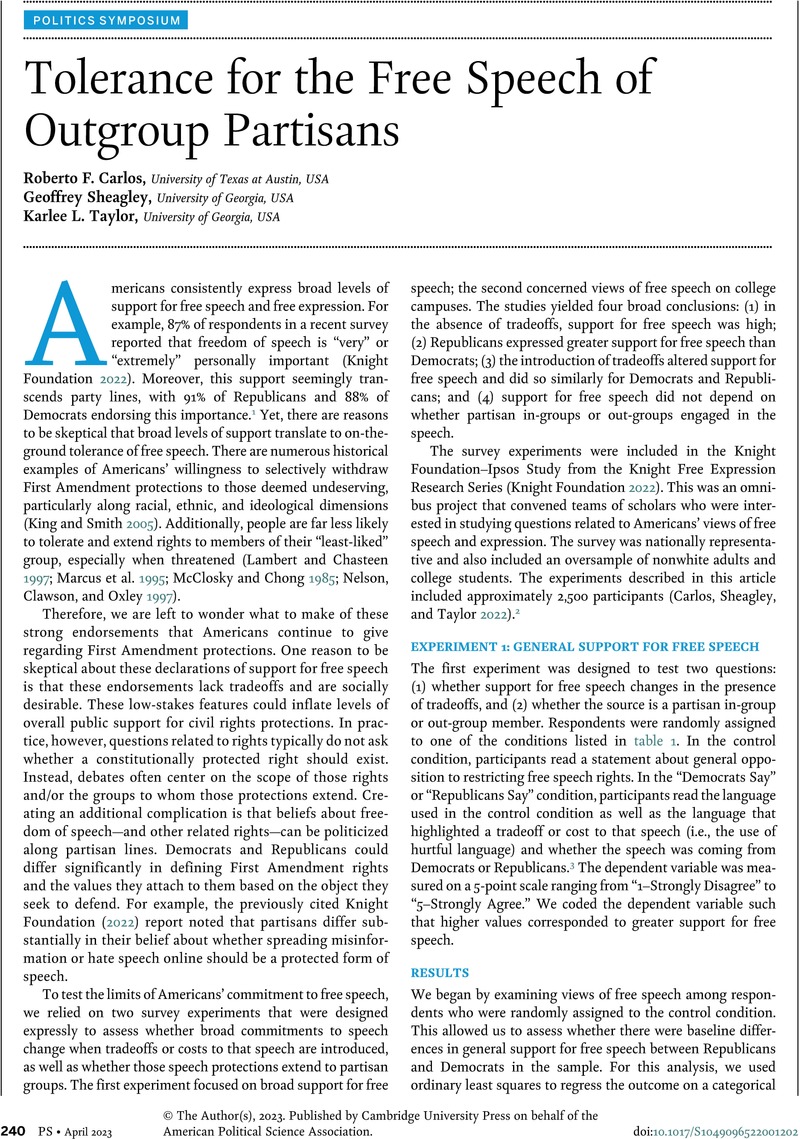No CrossRef data available.
Article contents
Tolerance for the Free Speech of Outgroup Partisans
Published online by Cambridge University Press: 05 January 2023
Abstract
An abstract is not available for this content so a preview has been provided. Please use the Get access link above for information on how to access this content.

- Type
- Freedom of Expression in an Age of Social Media, Misinformation, and Political Polarization
- Information
- Copyright
- © The Author(s), 2023. Published by Cambridge University Press on behalf of the American Political Science Association
References
REFERENCES
Alvarez, Mauricio J., and Kemmelmeier, Markus. 2018. “Free Speech as a Cultural Value in the United States.” Journal of Social and Political Psychology 5 (2): 707–35.CrossRefGoogle Scholar
Carlos, Roberto F., Sheagley, Geoffrey, and Taylor, Karlee L.. 2022. “Replication Data for ‘Tolerance for the Free Speech of Outgroup Partisans.’” PS: Political Science & Politics. DOI:10.7910/DVN/EP63RI.Google Scholar
Chong, Dennis. 1993. “How People Think, Reason, and Feel about Rights and Liberties.” American Journal of Political Science 37 (3): 867–99.CrossRefGoogle Scholar
Chong, Dennis, Citrin, Jack, and Levy, Morris. 2021. “The Realignment of Political Tolerance in the United States.” Unpublished manuscript. https://doi.org/10.2139/ssrn.3951377.CrossRefGoogle Scholar
Crawford, Jarret T., and Pilanski, Jane M.. 2014. “Political Intolerance, Right and Left.” Political Psychology 35 (6): 841–51.CrossRefGoogle Scholar
Hutchings, Vincent L., and Valentino, Nicholas A.. 2004. “The Centrality of Race in American Politics.” Annual Review of Political Science 7 (1): 383–408.CrossRefGoogle Scholar
King, Desmond S., and Smith, Rogers M.. 2005. “Racial Orders in American Political Development.” American Political Science Review 99 (1): 75–92.CrossRefGoogle Scholar
Knight Foundation. 2022. “A Landmark Survey of Americans’ Views on Speech Rights.” A Knight Foundation–IPSOS Study from the Knight Free Expression Research Series. Free Expression in America Post-2020. https://knightfoundation.org/reports/free-expression-in-america-post-2020.Google Scholar
Lambert, Alan J., and Chasteen, Alison L.. 1997. “Perceptions of Disadvantage Versus Conventionality: Political Values and Attitudes Toward the Elderly Versus Blacks.” Personality and Social Psychology Bulletin 23 (5): 469–81.CrossRefGoogle Scholar
Marcus, George E., Sullivan, John L., Theiss-Morse, Elizabeth, and Wood, Sandra L.. 1995. With Malice Toward Some: How People Make Civil Liberties Judgments. Cambridge: Cambridge University Press.CrossRefGoogle Scholar
McClosky, Herbert, and Chong, Dennis. 1985. “Similarities and Differences Between Left-Wing and Right-Wing Radicals.” British Journal of Political Science 15 (3): 329–63.CrossRefGoogle Scholar
Nelson, Thomas E., Clawson, Rosalee A., and Oxley, Zoe M.. 1997. “Media Framing of a Civil Liberties Conflict and its Effect on Tolerance.” American Political Science Review 91 (3): 567–83.CrossRefGoogle Scholar
Omi, Michael, and Winant, Howard. 2014. Racial Formation in the United States. New York: Routledge.CrossRefGoogle Scholar
Saavedra Cisneros, Angel, Carey, Tony E. Jr., Rogers, Darrin L., and Johnson, Joshua M.. 2022. “One Size Does Not Fit All: Core Political Values and Principles Across Race, Ethnicity, and Gender.” Politics, Groups, and Identities 1–20. DOI:10.1080/21565503.2022.2044869.CrossRefGoogle Scholar




